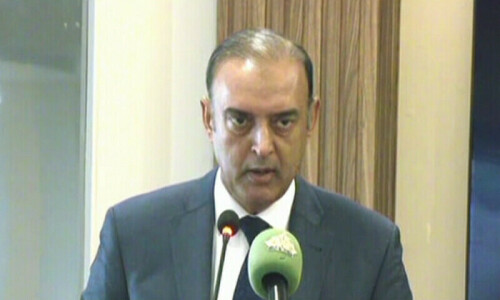LONDON: Communal rioting in two cities. Bricks and bottles thrown and civic buildings wrecked. Flags torn down and 15 police injured. Local politicians forced to go into hiding. It happens all over the world, but this week it happened in the United Kingdom, in Belfast and nearby Carrickfergus, evidence of continuing lack of community concord in Northern Ireland.
Yet I am not aware of Israel's prime minister or the leaders of Hamas summoning British ambassadors to register their “dismay” at this threat to the peace process, or offer their good offices to “bring about reconciliation”. Since the rulers of Syria and Egypt receive daily lectures from London, they might at least offer a suggestion or two in return. And in Britain’s hour of need, why such silence from Kabul, Tehran and Islamabad? As for America, its secretary of state, Hillary Clinton, visits Belfast on Friday, but I doubt if she will even mention the riots. She will discuss trade, world peace and other waffle.
Britain's foreign secretary, William Hague, is no such wimp. This week he surveyed the globe on his desk and declared his “deep concern” over events in Egypt. He told the Egyptians to “resolve their difference through a process of dialogue which allows all voices to be heard”. London used to rule Cairo from his office, so he clearly felt this should do the trick.
The foreign secretary turned to Palestine and deplored the shelling of Israeli towns. He then felt it best also to deplore “the recent Israeli government decision to build 3,000 new housing units and unfreeze development” round Jerusalem. Indeed, he specifically told the Israeli government “to reverse this decision”. His office later announced its outrage that the Israelis “have not heeded” what he told them. And this from a country Britain virtually created.Syria too is much on Hague's mind, with prime minister David Cameron constantly asserting that “doing nothing is not an option”. Hague is “appalled at the widespread and systematic human rights violations committed by the regime and its militia” which “deserve the strongest condemnation”. Was not Damascus once ruled (briefly) by Britain's Lawrence of Arabia? And what of rape in the Democratic Republic of the Congo.
Hague found time in a busy schedule to declare it “one of the worst things happening in the world today”. Indeed, publicising it “removes anybody's excuse for not doing something”.
Hague is intoxicated by the aroma of office. It works him into a frenzy of rhetorical interventionism. He stalks the ancient corridors of his offices attended by the ghosts of empires past, of Pitt, Castlereagh, Palmerston, Salisbury, Bevin. They were men whose fury made whole continents quake, and whose kisses dried the world's tears. Hague walks past murals of Britannia Nutrix, Britannia Bellatrix, Britannia Colonorum and, grandest of all, Britannia Pacificatrix. Nothing is beyond its remit. It turns the strongest head.
Yet these walls mock Britain's fallen glory. When Hague declares some regime “unacceptable”, it ignores him. When something appals him, its stays appalling. “What we want to see” remains unseen. When the poor chap stamps his foot on the world stage, he only stubs his toe.
The craving of British governments to tell the world its business is no more than a mildly embarrassing post-imperial itch.
Normally the result is mere words, an echo of Washington. When occasionally British forces are deployed to back them up, they are in America's back pocket. They sometimes succeed in toppling regimes, at huge cost in foreign lives and British taxes, but rarely lead to peace and democracy.
Usually, as now in Syria and Iran, these interventions boil down to mere bombast, sabre rattling, saying boo to various geese and then running away. Britain has been flourishing “support” for the Syrian rebels, which it thankfully has no intention of delivering. But as the factions get ever more opaque, London's weekly bromides are ever more like those of a schoolmaster breaking up a classroom fight by telling everyone to grow up and behave.
Former prime minister Tony Blair's obsessive exaggeration of the threat to Britain from Muslim “terrorism” has led to a decade of toppling or undermining Muslim regimes, with no noticeable relaxing of security paranoia in Britain. It has involved the hypocrisy of backing “our autocrats”, in Saudi Arabia and Bahrain, but not others. It has yielded no regional stability or improvement to British interests in the area. Middle East diplomacy, once the jewel in the Foreign Office crown, has become plain dumb.
The Troubles in Northern Ireland are not on a par with those afflicting the Middle East. But they reflect a real British failure at local “nation-building”. Belfast is the only city outside Israel that must erect walls to keep warring communities apart. The lack of communal accord should evoke modesty from London towards the similar troubles of others. How dare we lecture them?
Hague's incessant nagging of the world is little more than diplomatic self-gratification, but he is not alone. It contributes to what the seasoned UN official Brian Urquhart called the “know-nothing ideology, anti-intellectualism, cronyism, incompetence and cynicism” that now pass for western foreign policy. Since that diplomacy is about to face the humiliation of defeat in Afghanistan and an “all options open” confrontation with Iran, surely we might have a period of silence from the imperialist ghosts of Britain's foreign office.
By arrangement with the Guardian














































Dear visitor, the comments section is undergoing an overhaul and will return soon.